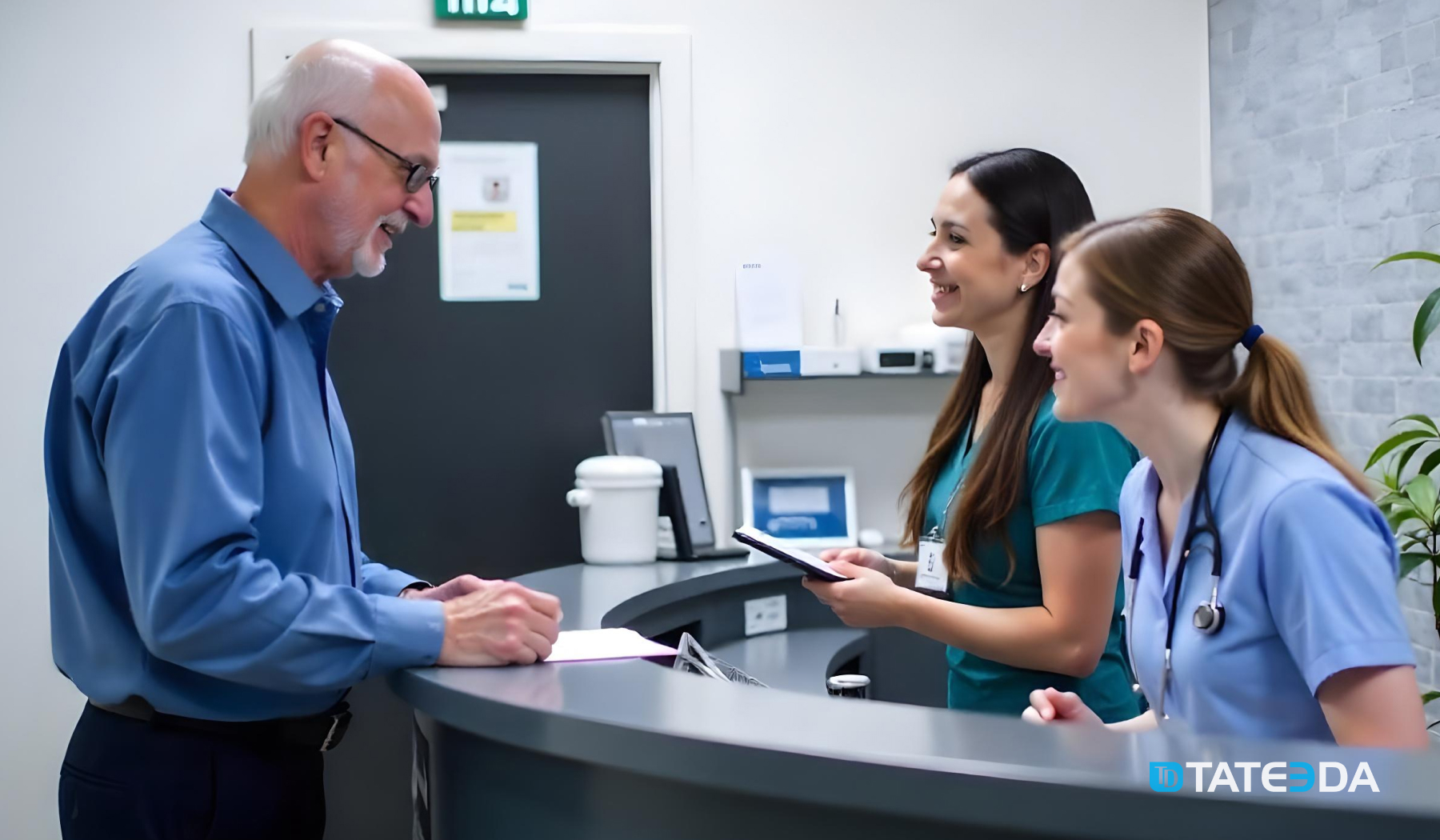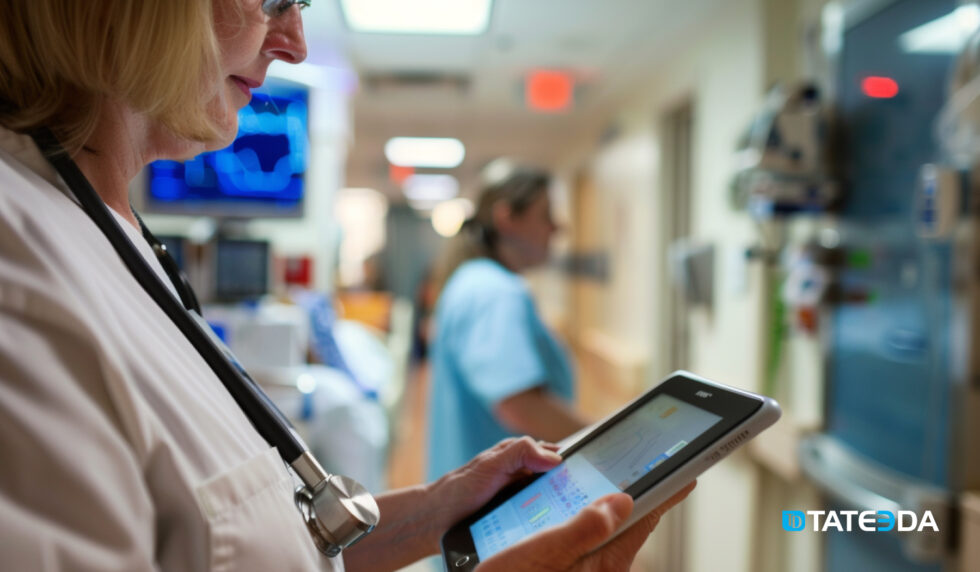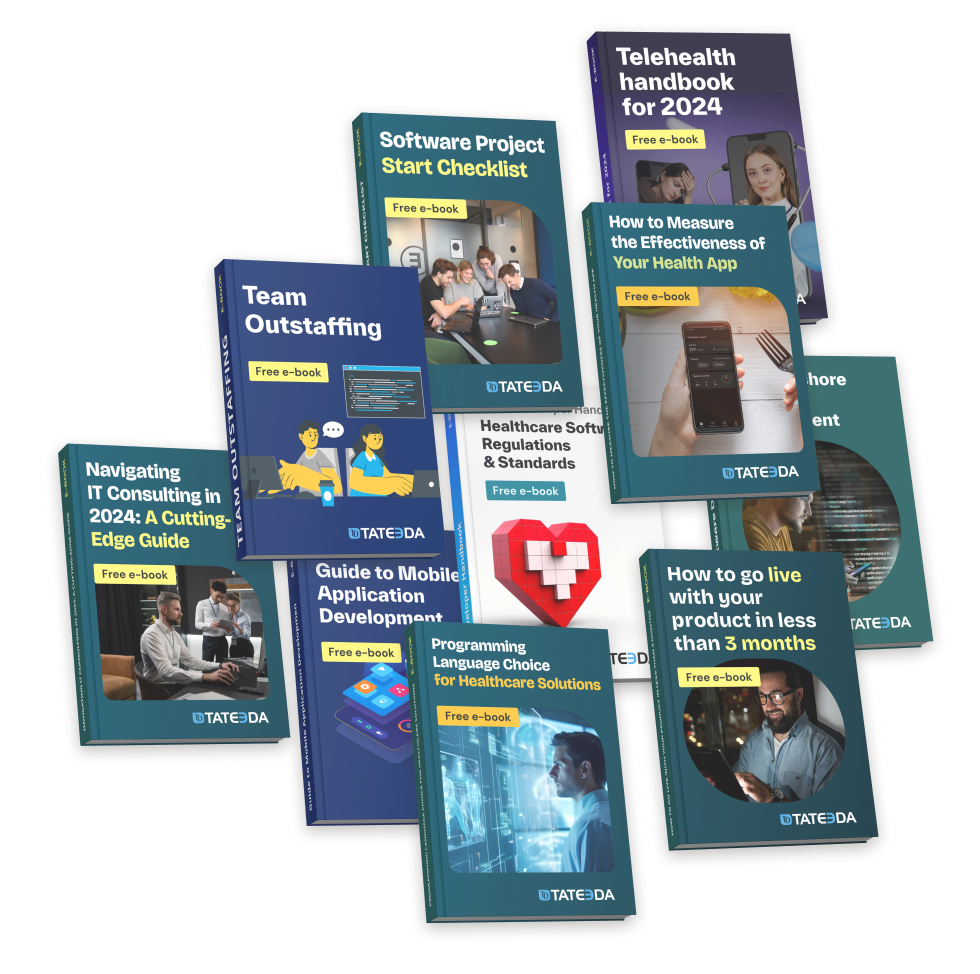The Complete Guide for the E-prescription Software Development in 2025

Can you imagine a time when e-prescriptions were rare?
In 2008, only 7% of prescribers sent digital prescriptions. Most still used handwritten notes and fax machines. By 2025, customized e-prescribing software solutions have become the backbone of U.S. healthcare. Today, 92% of prescribers rely on e-prescription app development integrated into EHR systems. Nearly every pharmacy or online medication vendor can now process e-prescriptions.
That’s an 85 percentage-point leap, a clear sign that digital prescribing is no longer just a convenient business option—it’s a must-have feature in nearly every healthcare software system, from EHR platforms to medical practice management solutions.
In this article about digital prescription platform development, we’ll discuss…
- The basics of customized e-prescribing software solutions.
- The most common e-prescription app features, implementation challenges, and benefits for patients, clinicians, and pharmacists.
- How to get qualified assistance with the creation of your custom electronic prescription system.
| ⚠️ If you require help with the development of an e-Prescription management application or an integrated solution for pharmacies, please contact our IT experts for individual project consultation! |
The concept of E-Prescribing (e-Rx, or electronic drug prescriptions) is not new in the United States, and is used daily by thousands of physicians, patients, and pharmacists.
The technology was actually launched decades ago and is now technically regulated by national standards.
Electronic prescription has proved to be a reliable, convenient, efficient bridge between healthcare providers, drugstores, patients, and health insurers.
E-prescription systems can be integrated with custom EHR solutions to gain a profound understanding of each patient’s medication history and health features without re-examining them for allergies or possible drug intolerances. Collaborating with a tech provider that blends e-prescription software integration skills with the competencies of an EHR software development company ensures seamless integration and customization tailored to your healthcare facility’s needs.
Thanks to the rapid enhancements in mHealth application development, electronic prescriptions have become an efficient component of modern telemedicine, including the following potential functionalities:
| Functionality | Description |
|---|---|
| EHR Integration | Prescriptions appear directly in the patient’s health record, ready for physician and pharmacy access. |
| Pharmacy Routing | Prescribers send medication orders to the patient’s preferred or nearest pharmacy without delays. |
| Drug Interaction & Allergy Checks | The system flags potentially harmful medication combinations or known allergens as suggested by each specific patient’s medical profile. |
| Insurance Eligibility & Coverage Match | Confirms whether a medication is included in the patient’s insurance plan before it reaches the pharmacy. |
| Controlled Substance Monitoring | Tracks all necessary data to meet DEA and local requirements for restricted medications. |
| Mobile Prescription Access | Patients use their smartphones or tablets to refill prescriptions or check details at any moment. |
| Telehealth Visit Sync | Prescriptions are issued during the same session as the virtual consultation, which reduces extra steps. |
E-prescription is not yet mandatory for all medical drugs prescribed in the U.S., but it is already necessary for certain controlled substances in several states, including North Carolina, Massachusetts, Arizona, Iowa, and others.
That has happened because the U.S. population has demonstrated growing (and terrifying) drug overdose mortality rates: in 2024, over 100K+ American citizens died from drug overdoses. The total number of preventable adverse drug events currently exceeds 1 million.
At TATEEDA GLOBAL, we have deep experience in developing pharmacy-related solutions for North American companies. For one of our customers, a pharma wholesaler, we built a pharmacy ordering/shipping automation system with a range of sophisticated integrations and components. This enabled a fully automated process for entering prescriptions into the system as well as the creation of auto-shipping labels.
Also, this customized e-prescribing software solution included role-based scenarios and settings for different specialists, like this:
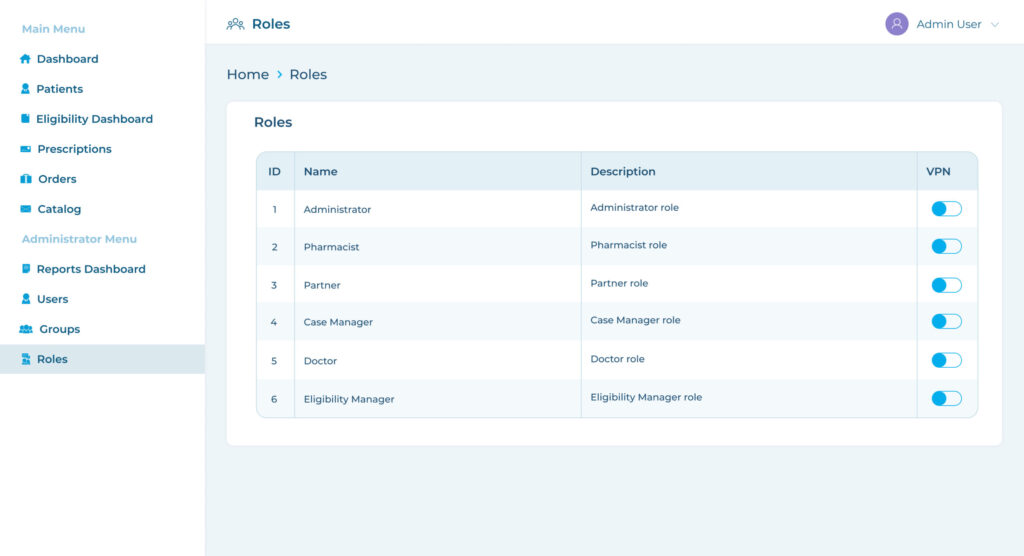
| Here’s why we want to share our custom e-prescription software development expertise with you… Designing and developing custom electronic prescription systems requires strong technical expertise, including: ✅ Frontend and backend architecture ✅ AI-automated biotech practices ✅ E-prescribing integration with EHR systems using APIs ✅ Optical document recognition ✅ Automated processing of sensitive documents. Additionally, ensuring HIPAA-compliant programming for AWS cloud environments is essential for secure and scalable deployment. We have a team of professional medical application developers and engineers who will gladly help you create custom electronic drug prescription software. Please book a free chat with our top tech specialist to get a project estimate… |
Let’s Build Customized
E-Prescribing Software Solutions
Our team offers HIPAA compliance and other skills needed to create custom electronic prescription systems in the US.
Table of Contents
How E-prescribing Software Improves Medical Workflows
Just in case you are wondering how an e-prescription system works…
In general terms, e-prescribing (eRx) software is used by prescribers (medical specialists) to electronically file and submit drug prescriptions to pharmacies. It saves time, paper, and…patient lives, too.
The key reason for developing e-prescription software and implementing e-Rx solutions in hospitals, clinics, medical centers, nursing homes, and pharmacies is to reduce the number of preventable adverse drug events in the United States.
One medical study suggests that over 7,000 patient deaths can be linked to illegible handwriting and other prescription errors.
E-prescription solutions (including all types of customized e-prescribing software solutions) are designed to eliminate this issue almost completely, as no handwriting is involved in electronic prescriptions. Many other types of human or medical errors are avoided, too.
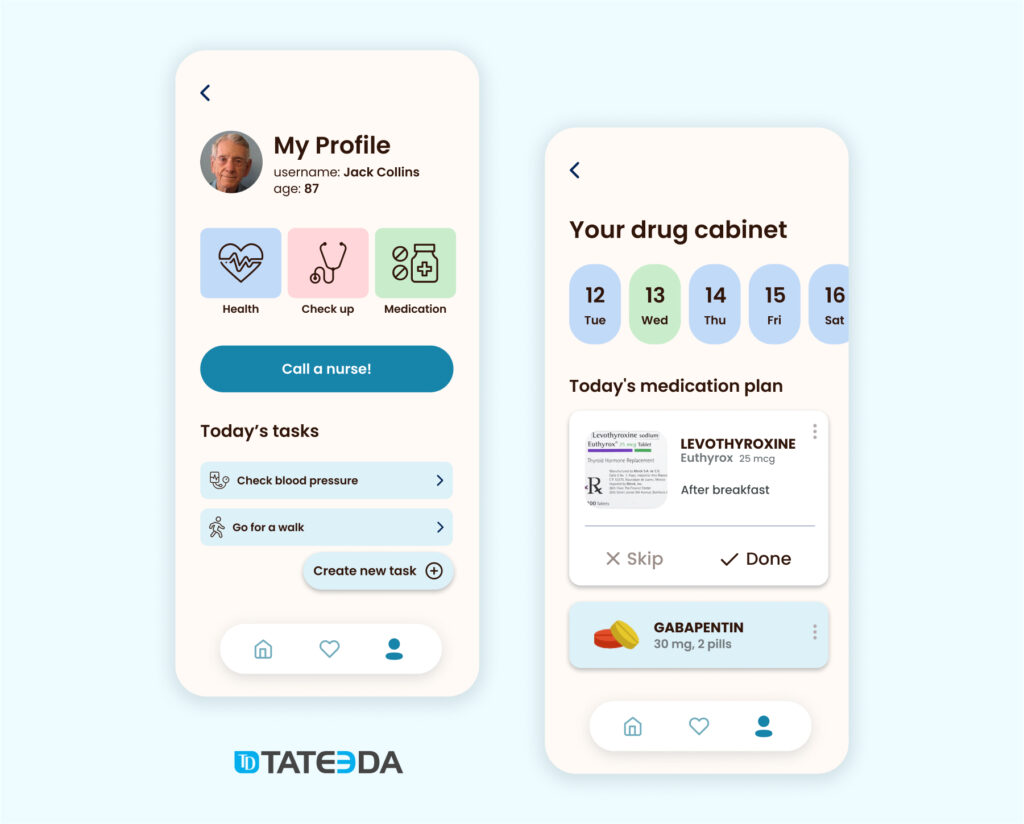
Let’s list the business processes/actions to be improved via the implementation of eRx software in hospitals, pharmacies, and other medical settings:
- Physicians (prescribers) are authorized to access the system. Medical personnel needs different permissions to add, access, or edit prescriptions based upon their roles and responsibilities.
- Identification of patient records in the system. This can involve data exchange with an EHR system, so full patient profiles (or their most important fragments) can be pulled from the database.
- Reviewing ongoing medications based upon electronic data extracted from EHR databases and/or provided by patient insurers.
- Checking patients’ historical data on health conditions, previous diseases and treatment plans, chronic diseases, allergies, and side-effect reports.
- Prescribing medications and selecting pharmacies where these prescriptions will be dispensed (drugs prepared and packaged).
- Management of medical drug names, dosages, details, instruction updates, and more.
- Printing of prescriptions, if required.
- Electronic submission of prescriptions to a transaction hub where information on patient eligibility and medical track record is verified and returned to the physician.
- Ensuring patient safety: automated caution messages with regard to potentially harmful drug interactions, allergies, and/or dosage issues.
- Offering therapeutically acceptable alternatives/equivalents for a range of factors, including cost-efficiency, manufacturing, etc.
- Two-way communication between U.S. healthcare process stakeholders: patients, medical specialists, dispensaries, pharmacies, health plans, health insurers, and more. This occurs either directly or through an intermediary hub or healthcare sub-service.
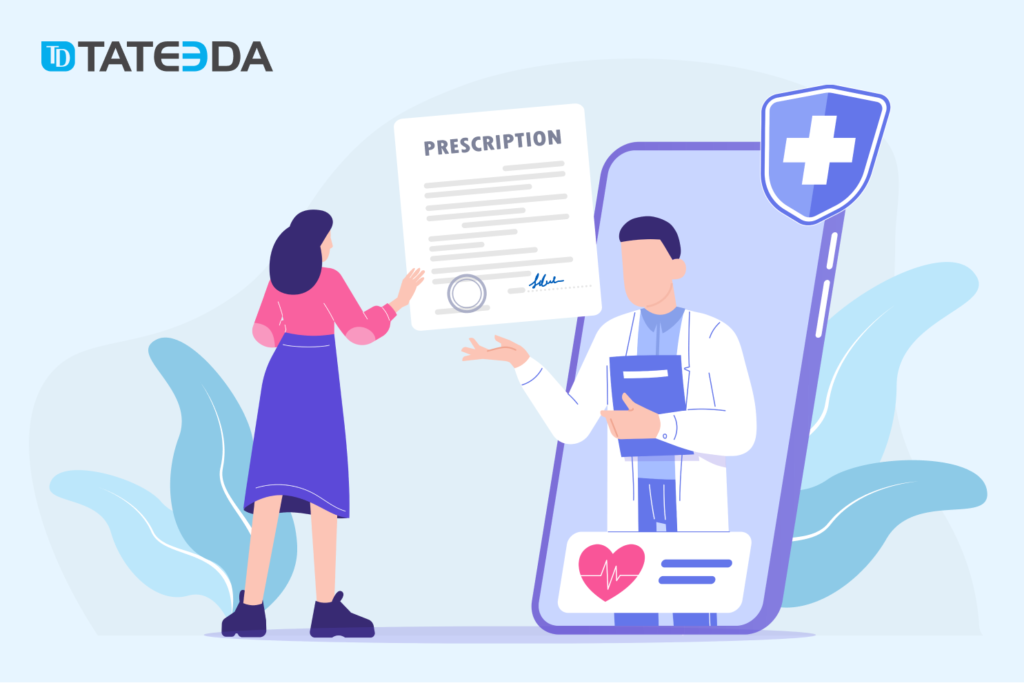
Are you dissatisfied with your current e-prescription solution?
Or are you considering developing e-prescription (eRx) software for your medical practice from scratch? In any case, you can rely on TATEEDA GLOBAL as your tech partner for building customized e-prescribing software solutions of any complexity.
We would be happy to assist you with the planning, architecting, and executing custom development of an e-prescription tool or an eRx system for your needs. We can also create more sophisticated custom pharmacy management software with an e-prescription component included.
Interested in Custom Digital Prescription Platform Development?
Our custom e-prescription software development specialists have been delivering solutions for U.S. customers since 2013.
Custom E-prescription Software Development Market Trends
The current global climate is exceedingly favorable for the development of customized e-prescribing software solutions:
- A rapidly increasing trend toward the adoption of AI and cloud technologies in EHR-connected solutions with APIs across the globe and in the United States alone.
- Government-backed initiatives/programs and projects aimed at reducing medical error.
- The continuously growing engagement of AI-managed components in biotech-related solutions and operations, including new drug research and automated drug stores.
- Since the COVID-19 endemic times, with the growing need for tools to support telemedicine and enforce stay-at-home policies, E-prescription software features have matured and are now recognized as a fundamental requirement for any healthcare software system
- The need to improve our approach to controlled substances with strict adherence to DEA, HIPAA, and DSCSA regulations.
- Mobile-based prescription management is a mainstream feature in 2025. More healthcare providers and patients now rely on mobile apps securely linked to cloud-based applications to handle digital prescriptions remotely and instantly.
- Online medication sales and e-commerce integration are now seamlessly connected. Branded pharmacies and drugstores incorporate e-prescription systems with automated order processing, inventory tracking, and direct-to-patient delivery services.
- AI-powered drug interaction alerts are elevating patient safety. Clinical decision support systems (CDSS) analyze prescriptions instantly and flag potential medication conflicts before they reach patients.
TATEEDA GLOBAL can help you to keep up with the latest technological trends in healthcare including the best practices of HIPAA-compliant e-prescription software development.
We know the ins and outs of the e-prescription software development process very well, and we would love to assist you with your project. TATEEDA is a California-headquartered full-cycle custom medical software development company featuring a powerful team of 100+ nearshore senior custom software development engineers.
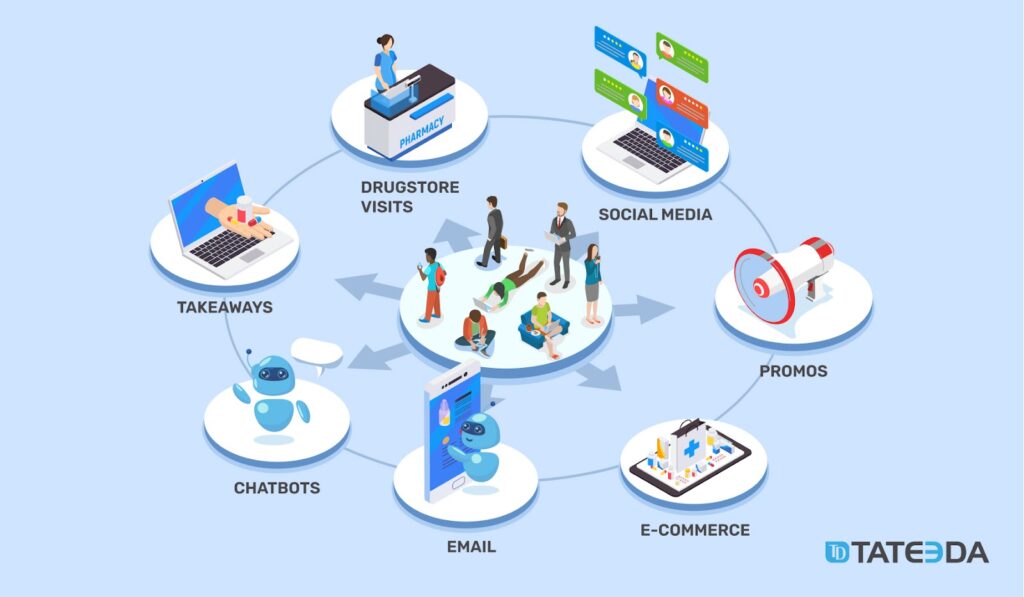
The Benefits of E-prescribing Systems & Custom Digital Prescription Platform Development
Various e-prescription app development solutions and strategies including e-prescribing integration with EHR and other relevant systems deliver numerous benefits to all involved parties: pharmacies, pharma product manufacturers, healthcare providers, and the patients themselves.
Customized e-prescribing software solutions bring in greater safety in a multitude of ways.
This type of software proved extremely valuable during the COVID-19 pandemic: custom electronic prescription systems helped reduce in-person visits to doctors and pharmacies while adhering to strict quarantine efforts. Now, in 2025, the pandemic may no longer define our daily lives—but the experience gained by developers of customized E-prescription software solutions during that period has left a lasting impact on HIPAA-compliant IT practices.
They introduced powerful features such as remote medication management and secure digital prescription delivery, which have now become the gold standard of digital prescription platform development. These tools continue to enhance convenience and safety, especially for elderly patients and those with mobility limitations, who benefit from staying home without compromising access to care.
Let’s check out the most important benefits of HIPAA-compliant e-prescription systems:
HIPAA-Compliant E-Prescription Software Development for You
If you need help with your custom e-prescription software project, please book a free chat with our IT technology strategists.
Benefit #1: Higher Safety Standards for Patients
No conflicting drug prescriptions
E-prescription software makes it possible to identify potential adverse drug interactions beforehand, so no conflicting or excessive prescriptions can be issued (i.e., polypharmacy.)
Instant health status/history report
eRx software also helps to:
- Spot all reported allergies, medication intolerances, and harsh reactions/side effects that a specific patient has ever experienced over the course of their lifetime.
- Prevent unsafe prescriptions.
- Provide patients with highly individualized treatment, including safer alternatives or drug equivalents.
Remote refills
With an e-prescription system in place, patients are no longer required to schedule an appointment with their physicians for consultation or prescription of refills.
Remote ordering of medication
E-prescription software eliminates the need for patients to visit a drugstore personally. Instead, their prescribed medications can be delivered right to their homes by a courier or even a drone. Read also: How to Benefit from Remote Patient-monitoring Software Development
Reduced incidence of preventable errors
Since no handwriting is involved in e-prescriptions, fewer mistakes will be made.

Benefit #2: New Opportunities for Patients, Medical Doctors, and Pharma Businesses
Authorized physicians can easily access all critical patient health records
Thanks to integration of e-prescription tools with EHR/EMR platforms and/or other medical systems, physicians can:
- Be automatically informed/reminded of their patients’ individualized medication needs.
- Instantly access other essential patient files, including insurance policies, eligibility data, and prescription benefit information.
- Check current/previous patient medication plans.
Read also: Patient Electronic Data-capture Solution Development
Reduced callbacks from pharmacies
Before e-prescriptions were widely introduced to the healthcare industry, physicians’ illegible handwriting was considered a real issue. Pharmacists often faced real hurdles in interpreting the prescriber’s handwriting.
The best scenario included pharmacists calling medical offices back to ask for drug prescription clarifications. In the worst scenarios, incorrect medications and/or inaccurate drug dosages could be given away to patients, potentially causing unpredictable outcomes for their health.
Read also: How to Build the Best Custom Medical Appointment-scheduling Software
No paper needed
It’s always good to get rid of paper when facilitating the process of medical document circulation. When healthcare providers employ electronic prescriptions, they no longer need to keep dusty, bulky piles of prescription copies or patient records on paper. Read also: When and Why You Need to Update Your Legacy Healthcare Software Systems.
Development of automated medication delivery and curbside pickup services
With e-prescription, it becomes possible to completely automate the process of online ordering and home delivery of prescription drugs, so minimal human interaction is needed:
- Prescription medication is automatically refilled within the required time period (recurring prescriptions can be managed via custom protected web and mobile patient portals).
- Patients and/or insurance providers are automatically charged for medications.
- Automated delivery follows up to close the deal.
In other words, the whole system works just like the automated subscriptions so many people have for TV or grocery-shopping services. With e-prescription, you can completely automate the process of online ordering and home delivery of prescription drugs.
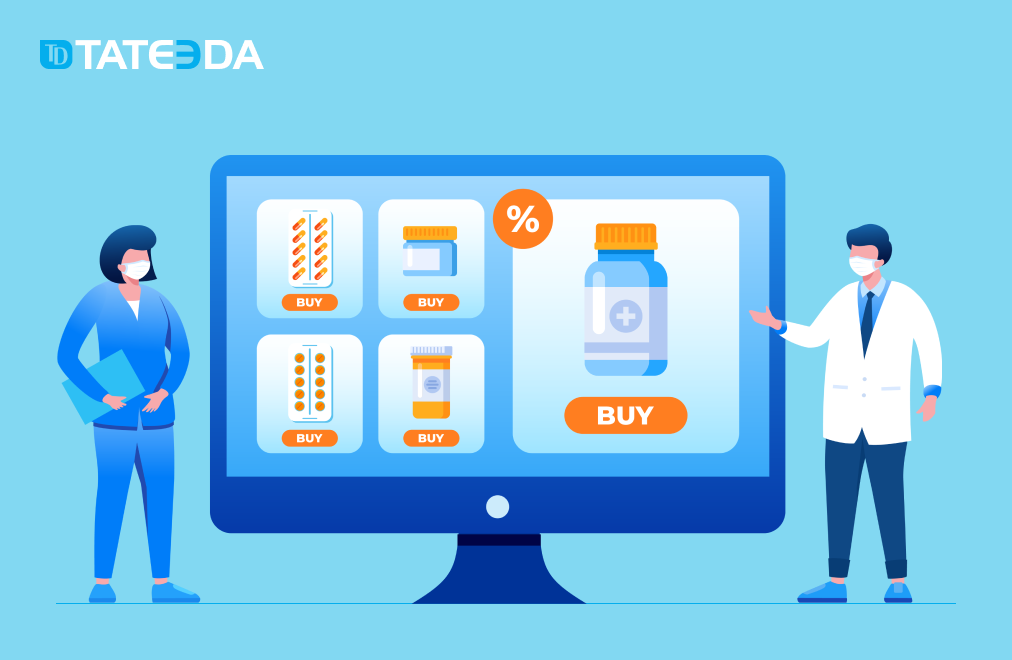
Learn more: ➡️ Legacy Systems in Healthcare: How to Upgrade Outdated Software Solutions
Benefit #3: Improved Patient Outcomes
Electronic prescription allows early spotting of medical mistakes and helps prevent them completely. No unclear prescriptions or contraindicated drugs, no risk of allergy or side effects.
This enhanced approach helps medical workers and pharmacists eliminate uncertainty and minimize the risk of incorrect prescriptions or erroneous interpretation by pharmacists, paving the way to an excellent treatment outcome for each patient.
Interested in building a custom e-prescription app for your medical practice?
At TATEEDA GLOBAL, we are ready to help you create an e-prescription system to suit your exact needs. We have a highly skilled team and considerable expertise in the development of custom medical software for U.S. companies.
If you have ideas or questions regarding your next project, be sure to contact us.
Common Functionalities/Features of E-Prescription Software
When you create e-prescription software from scratch, you can design your own set of software features.
Let’s consider a few of the essential capabilities of e-prescription software:
User Dashboards
Different categories of users (pharmacists, prescribers, patients, and others) need their own way of accessing and reviewing e-prescriptions. Each user type can get their own individual means to create, send, manage, and receive e-prescriptions: web portals, mobile apps, integrated solutions, and more.
Read also: mHealth App Development: The Ultimate Guide
Therapy Management
Today, medical drug options are almost limitless. Physicians (prescribers) should be allowed to choose from a variety of medication equivalents and alternatives, including generic names and branded drugs. Other factors to consider include the cost-efficiency of the selected therapy, the age and specific chronic diseases of the patient, and much more.
Custom Healthcare Solutions
See how we can engineer healthcare software, validate your ideas, and manage project costs for you.
Generation and Submission of Drug Prescriptions
Physicians should have the ability to create new prescriptions and forward them to the next step in the process from their computers or tablets. The next step in the process is usually sending the prescription to the pharmacy of a choice, but there could be more options, such as a transition hub in between.
Tracking of Prescription Fulfillment
Once an electronic prescription has been created and submitted to the pharmacy, it’s crucial to make sure the pharmacy has successfully accepted/verified the prescription and processed it according to a specific sequence of events (or rejected it for a reason.)
Patients may want to review their prescriptions and upcoming orders or refills with the help of a web or mobile access portal. In turn, physicians may need to control whether medications are supplied to specific patients (notifications may come in a variety of ways, i.e. email, mobile, or in-system.)
Adverse Interaction Prevention
If the risk of adverse interaction is detected, eRx software will notify the physician and suggest better alternatives. The fullest and most accurate patient information can be aggregated via e-prescription integration with EMR (electronic medical records) or EHR platforms. The system is capable of suggesting a long-term track for each patient’s health problems and specifics. Read also: Custom EHR/EMR Software Development: The Complete Guide
Refill Requests
Pharmacies can offer refill requests to physicians within the software environment. Healthcare providers can then approve or deny these queries electronically.
Medication History
E-prescription solutions allow medical workers to access each patient’s medication history, which can be imported from a variety of sources: a partner pharmacy’s database, the medication claims history delivered by insurance payers or pharmacy benefits managers, or information taken from their own EHR/EMR system.

The Challenges of Implementing E-prescription Application
- Obsolete or poorly managed IT infrastructure in medical organizations.
- Poor awareness among patients.
- Security issues. E-prescription software should come with the highest level of security and fraud protection. Moreover, it should fully comply with HIPAA specifications.
- Poorly developed or undertested electronic e-prescription software that generates errors or incorrectly formatted prescriptions.
- Complicated or cumbersome software interfaces that make it difficult for medical or pharmacy staff to process e-prescriptions and forms.
Learn more: Online Pharmacy App Development Guide
E-prescription Software Integration into Telemedicine Platforms
One of the most obvious ways to use e-prescriptions is in integration with telehealth solutions of all types. A custom patient telemedicine solution can be coupled with e-prescription tools via API integration like these:
- EHR system synchronization to pull patient records and medication history instantly
- Doctor-to-pharmacy routing to send prescriptions directly from virtual consultations
- Drug interaction verification using clinical decision support logic during the prescription process
- Insurance eligibility check and formulary validation within the telehealth interface
- Secure digital signature support to authorize medical prescriptions electronically
- Patient notification system to alert users when prescriptions are sent or available for pickup
- Medication tracking dashboards that help users view and manage prescriptions after each visit
- Multi-device access, so patients can manage prescriptions through smartphones, tablets, or desktop apps.
Once a patient has registered within a telehealth platform and been remotely seen by a physician or other medical specialist, they can find and manage their electronic prescription(s) in a specific protected section within their account settings. A copy can be sent to their email address.
Delivered Healthcare Software Portfolio
The leading American healthcare companies benefit from working with us.
Integration of a telehealth system with eRx software can be implemented for existing telemedicine platforms or included as an additional option to a newly designed multi-platform data management solution for a hospital or medical center.
If you need any type of eRx software or telehealth system integration, TATEEDA GLOBAL is readily available to help you. Be sure to contact us and share your project ideas.
TATEEDA GLOBAL’s Experience in Developing E-prescription Solutions
TATEEDA GLOBAL is not new to pharma systems, telemedicine software development, and electronic prescription software with integrated patient billing solutions and custom healthcare user access portals with hierarchical roles for medical staff, patients, partners, and so on.
First of all, we are masters of creating HIPAA-compliant medical solutions. We have vast experience building software solutions for U.S. pharma companies.
Our successful customized E-prescribing software solutions include:
- Pharmaceutical Business Automation Web Platform Development
- Online Pharmacy Insurance Claims-processing and Medication Fulfillment Solution Development
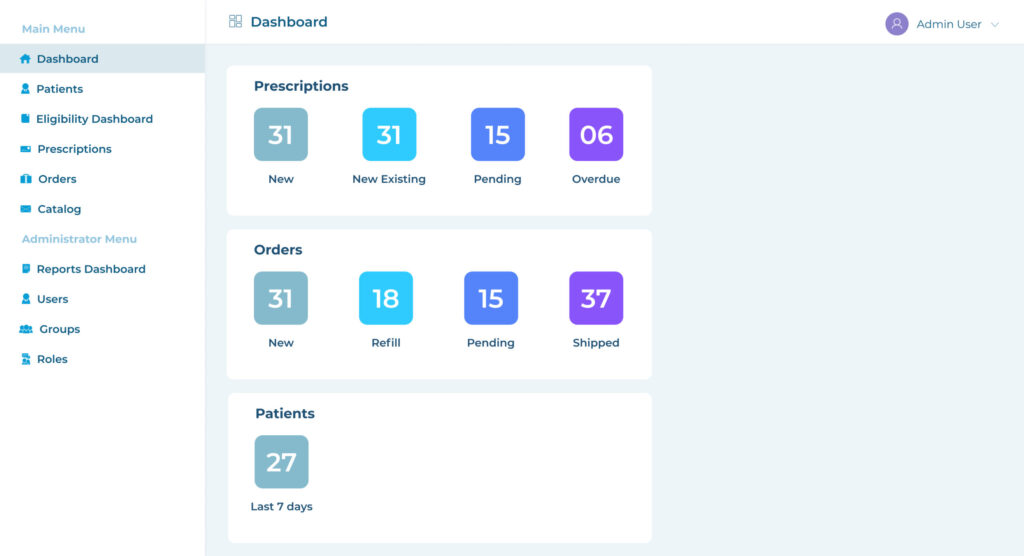
Our custom e-prescription app development solutions encompass the following features (but are not limited to these):
- Business automation platforms for pharma wholesalers and drugstores, including cross-system integrations for smooth data transit
- Automated processes of entering pharmaceutical prescriptions and pharmacy claims into the system including OCR-based PDF-scanning algorithms
- Order and delivery tracking module integrations featuring Google Maps and other geotracking or geolocation services
- Automated medication labeling
- Protected communication for electronic document transmission and protected access portals for patients and medical workers
- And much more E-prescription software features…
If you’re seeking qualified help in custom medical e-prescription software development or e-prescription app development project dedicated team services, contact TATEEDA GLOBAL for a free consultation.
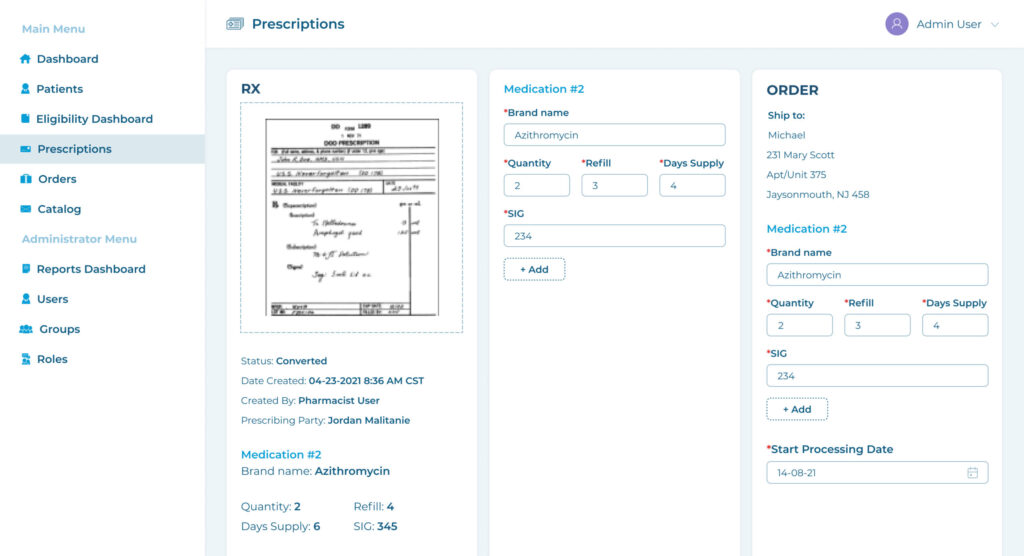
In Conclusion
E-prescriptions are in high demand by healthcare organizations.
What is the cost of building the e-prescription app with a US IT partner? It depends…but we know how to manage the costs of HIPAA-compliant e-prescription software development for you.
If you need a professional dedicated IT team to help you build a custom e-prescription solution or reinforce your existing eRx projects, TATEEDA GLOBAL is here for you!
In the context of e-prescription app development services we offer:
- Full-cycle e-prescription software development
- E-prescription software project assistance, augmentation, and product testing
- E-prescription legacy software upgrades and reengineering
- Software support and maintenance for medical systems
- E-prescription software compliance with HIPAA requirements and regulations
- Affordable project costs, thanks to our R&D branch in Ukraine
- Personalized connection with our project manager HQ in San Diego, CA
- Vast onsite experience with U.S.-based IoT, healthcare, biotech, and pharma businesses
- Fast team deployment—within 48-72 hours.
Contact TATEEDA GLOBAL today to start developing the e-prescription system of your dreams!



